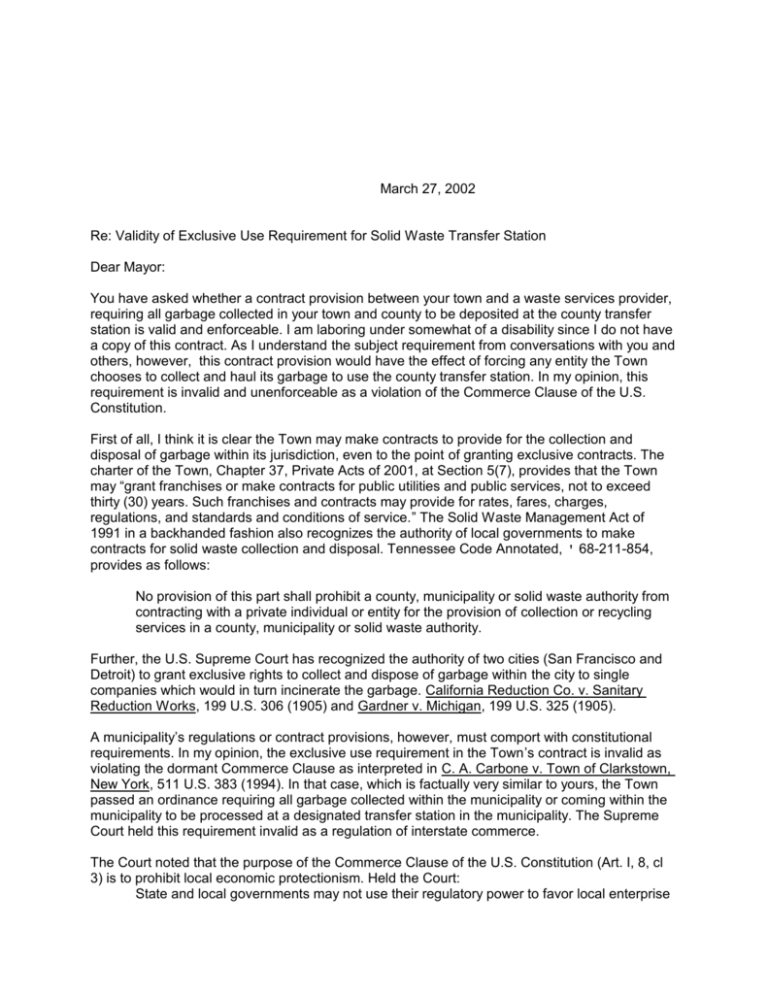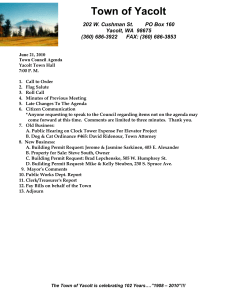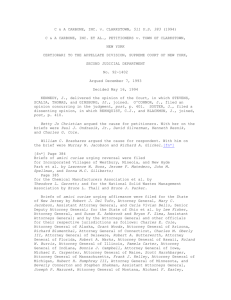Solid Waste Transfer Station public
advertisement

March 27, 2002 Re: Validity of Exclusive Use Requirement for Solid Waste Transfer Station Dear Mayor: You have asked whether a contract provision between your town and a waste services provider, requiring all garbage collected in your town and county to be deposited at the county transfer station is valid and enforceable. I am laboring under somewhat of a disability since I do not have a copy of this contract. As I understand the subject requirement from conversations with you and others, however, this contract provision would have the effect of forcing any entity the Town chooses to collect and haul its garbage to use the county transfer station. In my opinion, this requirement is invalid and unenforceable as a violation of the Commerce Clause of the U.S. Constitution. First of all, I think it is clear the Town may make contracts to provide for the collection and disposal of garbage within its jurisdiction, even to the point of granting exclusive contracts. The charter of the Town, Chapter 37, Private Acts of 2001, at Section 5(7), provides that the Town may “grant franchises or make contracts for public utilities and public services, not to exceed thirty (30) years. Such franchises and contracts may provide for rates, fares, charges, regulations, and standards and conditions of service.” The Solid Waste Management Act of 1991 in a backhanded fashion also recognizes the authority of local governments to make contracts for solid waste collection and disposal. Tennessee Code Annotated, ' 68-211-854, provides as follows: No provision of this part shall prohibit a county, municipality or solid waste authority from contracting with a private individual or entity for the provision of collection or recycling services in a county, municipality or solid waste authority. Further, the U.S. Supreme Court has recognized the authority of two cities (San Francisco and Detroit) to grant exclusive rights to collect and dispose of garbage within the city to single companies which would in turn incinerate the garbage. California Reduction Co. v. Sanitary Reduction Works, 199 U.S. 306 (1905) and Gardner v. Michigan, 199 U.S. 325 (1905). A municipality’s regulations or contract provisions, however, must comport with constitutional requirements. In my opinion, the exclusive use requirement in the Town’s contract is invalid as violating the dormant Commerce Clause as interpreted in C. A. Carbone v. Town of Clarkstown, New York, 511 U.S. 383 (1994). In that case, which is factually very similar to yours, the Town passed an ordinance requiring all garbage collected within the municipality or coming within the municipality to be processed at a designated transfer station in the municipality. The Supreme Court held this requirement invalid as a regulation of interstate commerce. The Court noted that the purpose of the Commerce Clause of the U.S. Constitution (Art. I, 8, cl 3) is to prohibit local economic protectionism. Held the Court: State and local governments may not use their regulatory power to favor local enterprise by prohibiting patronage of out-of-state competitors or their facilities. 511 U.S. at 394. In Carbone, the Clarkstown flow control ordinance required the nonrecyclable portion of waste to be sent to the Town’s transfer station, thus driving up the costs for out-of-state waste businesses to dispose of their waste. In the situation in your townr, as I understand it, all solid waste would have to be taken to the county transfer station. This would drive up the costs for out-of-state waste haulers to an even greater extent than the ordinance requirement in Carbone. It would also prohibit out-of-state companies from using their own facilities that might be in another state. This is the economic protectionism that the Carbone case condemns. The Court points out that there might be an escape mechanism in a very few cases: Discrimination against interstate commerce in favor of local business or investment is per se invalid, save in a narrow class of cases in which the municipality can demonstrate, under rigorous scrutiny, that it has no other means to advance a legitimate local interest. 511 U.S. at 393. The Town pointed to safety, environmental, and financial concerns in its argument that this was such a case, but the Court rejected all of them. The Town argued that the requirement that waste be taken to its transfer station steered solid waste away from disposal sites the Town deemed environmentally harmful. To allow this, the Court said, would extend the police power of the Town beyond its jurisdictional boundaries. As for safety, the Town could enact uniform safety regulations. The Court did recognize that the flow control ordinance did serve a purpose that nonprotectionist legislation would not: profitability of the transfer station. In rejecting this as a justification for discrimination, the Court said: By itself, of course, revenue generation is not a local interest that can justify discrimination against interstate commerce. Otherwise States could impose discriminatory taxes against solid waste originating outside the State. (Citations omitted.) Clarkstown maintains that special financing is necessary to ensure long-term survival of the designated facility. If so, the town may subsidize the facility through general taxes or municipal bonds.(Citation omitted.) But having elected to use the open market to earn revenues for its project, the town may not employ discriminatory regulation to give that project an advantage over rival businesses from out of State. 511 U.S. at 393,394. Our own Sixth Circuit Court of Appeals has had occasion to apply Carbone. In Waste Management Inc. of Tennessee v. Metropolitan Government of Nashville and Davidson County, 130 F. 3d 731 (CA6, 1997), the court ruled invalid a Nashville flow control ordinance that required all residential waste to be disposed of at the Nashville Thermal Transfer Corporation. Nashville argued that its ordinance did not discriminate against interstate commerce since nonresidential waste could be disposed of outside Metro or outside the state. The court was unimpressed, holding that “plaintiff’s ability to send some waste to facilities other than NTTC goes to the extent of the discrimination, not whether there was discrimination in the first place.” 130 F. 3d at 736. The court also conceded that there were local interests that were advanced by the ordinance, such as financial viability. As the Supreme Court did in Carbone, however, the Sixth Circuit held that there were other nondiscriminatory ways to advance those interests. The court suggested charging competitive tipping fees and noted that Metro had admitted that collections could be increased either directly or by contract. The court held: Because defendant’s flow control provisions are facially discriminatory, and because there are other means of advancing the legitimate local interests cited, these provisions cannot satisfy the rigorous scrutiny to which such laws are subjected under the Commerce Clause. 130 F. 3d at 736. Your town and county situation involves a contract restriction on flow control rather than an ordinance as in the Carbone and Nashville cases. You need to be aware of a line of cases that uphold certain contractual situations that might appear to discriminate against interstate commerce. These cases recognize a market participant exception to Commerce Clause constraints. This exception has been referred to as allowing contract flow control. See Michael J. Podolsky and Manahem Speigel, “When Does Interstate Transportation of Municipal Solid Waste Make Sense and When Does It Not?”, Public Administration Review, May, 1999, p.252. Perhaps the leading case recognizing the market participant exception is USA Recycling,Inc. v. Town of Babylon, 66 F. 3d 1272 (CA2, 1995). In this case the Town made en exclusive contract with a company to collect and dispose of garbage in a certain collection district. As part of the contract, the town allowed the contractor to dispose of 96,000 tons of waste free at an incinerator the town had a right to use. Other waste companies contended this was thinly disguised flow control as condemned in Carbone. The Second circuit saw it otherwise, finding that there was no discrimination against interstate commerce because these companies could have been awarded the contract if their bids had been acceptable. According to the court, “The Town has not favored in-state garbage haulers over out-of-state competitors.” 66 F. 3d at 1283. Further, the Babylon scheme did not require haulers to buy processing or disposal services at a local facility and there was no “forced business transaction.” 66 F. 3d at 1283. The market participant exception has not been adopted by the Sixth Circuit, and even if it had, I do not think it would apply in your situation. Although the Town restriction is created by contract rather than by ordinance, the effect is the same. There is the favoring of a local facility and a “forced business transaction” if a hauler wants to do business with the Town. The market participant cases simply recognize the authority of municipalities to make exclusive contracts with waste disposal companies who might themselves use local facilities exclusively but who would also be free to use out-of-state facilities. As long as the Town gives an equal opportunity to out-of-state companies to bid on these contracts, there is no Commerce Clause violation. I hope this is useful. If you have further questions, please contact me. Sincerely, Dennis Huffer Legal Consultant








